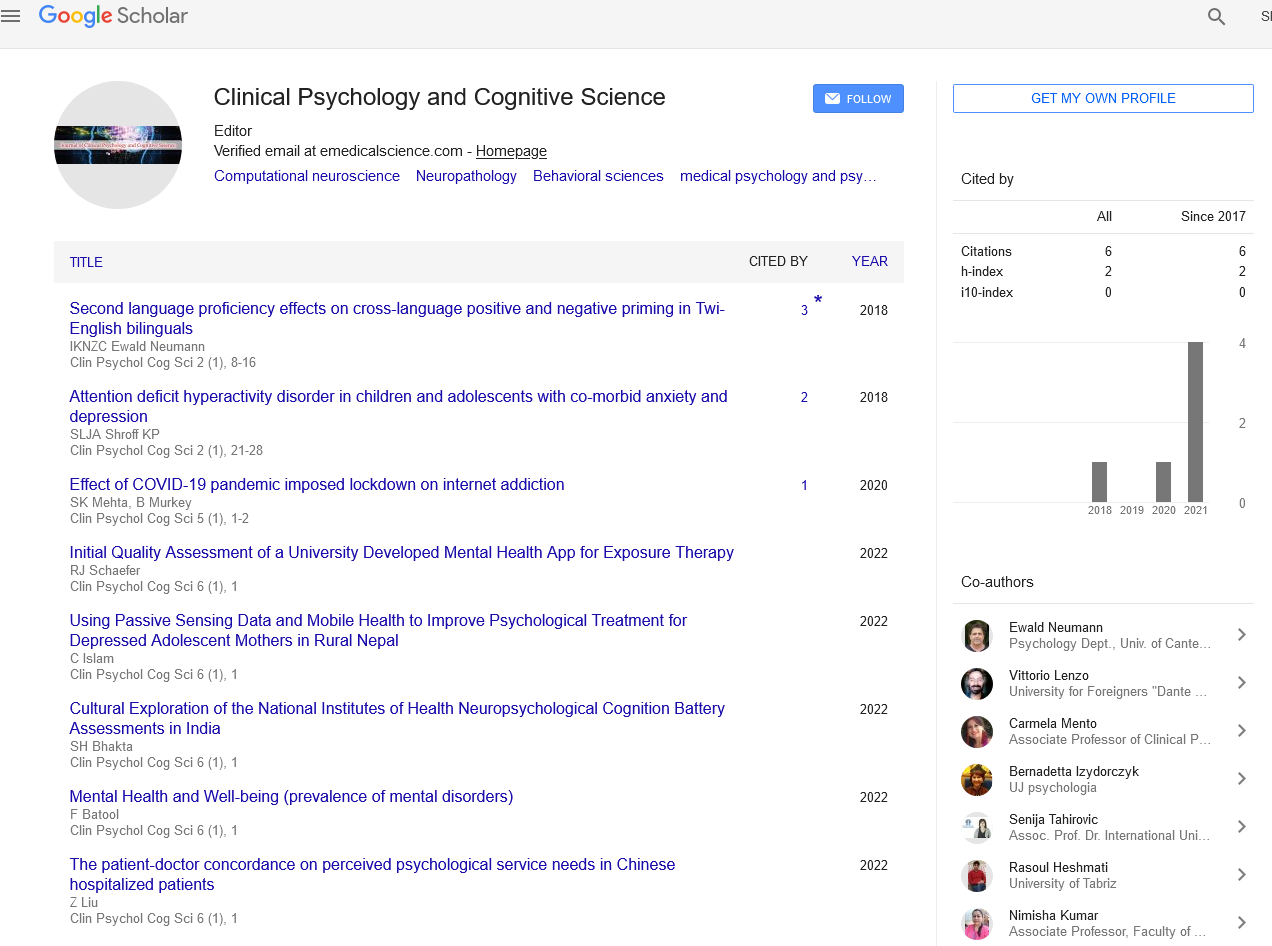Effect of harmful treatments in psychotherapy
Received: 06-Sep-2021 Accepted Date: Sep 20, 2021; Published: 27-Sep-2021
Citation: Timothy D (2021) Effect of harmful treatments in psychotherapy.ClinPsychol Cog Sci.2021; 5(2):4.
This open-access article is distributed under the terms of the Creative Commons Attribution Non-Commercial License (CC BY-NC) (http://creativecommons.org/licenses/by-nc/4.0/), which permits reuse, distribution and reproduction of the article, provided that the original work is properly cited and the reuse is restricted to noncommercial purposes. For commercial reuse, contact reprints@pulsus.com
Abstract
When someone receives psychotherapy, they have hope of recovery. But if they don’t, what’s the worst case scenario? Will this therapy prove to be ineffective? In fact, treatment can be harmful. Research shows that, on average, about 10% of clients actually get worse after starting treatment. However, belief in the safety of psychotherapy still exists and is widespread. In 2006, Charles Boisvert of the Rhode Island Cognitive Behavioral Therapy Center and David Faust of Brown University School of Medicine conducted a survey of 181 practicing psychologists across the United States. They found that a large percentage (28%) did not know the negative effects of psychotherapy. "One of the subtle things we investigated," Boisvert said, "is whether psychologists’ perceived familiarity with psychotherapy research is consistent with their actual familiarity. This is not the case-some clinicians think they are aware of the research, but in the actual test, they did not perform well.”
Description
When someone receives psychotherapy, they have hope of recovery. But if they don’t, what’s the worst case scenario? Will this therapy prove to be ineffective? In fact, treatment can be harmful. Research shows that, on average, about 10% of clients actually get worse after starting treatment. However, belief in the safety of psychotherapy still exists and is widespread. In 2006, Charles Boisvert of the Rhode Island Cognitive Behavioral Therapy Center and David Faust of Brown University School of Medicine conducted a survey of 181 practicing psychologists across the United States. They found that a large percentage (28%) did not know the negative effects of psychotherapy. "One of the subtle things we investigated," Boisvert said, "is whether psychologists’ perceived familiarity with psychotherapy research is consistent with their actual familiarity. This is not the case-some clinicians think they are aware of the research, but in the actual test, they did not perform well.”
In this apparently ignorant background, Emory University psychology professor Scott Lilienfeld said. The United States put aside professional sensitivity last year and put forward a tentative list of potentially harmful therapies based on recent research-"work that needs to be revised and improved." In a letter in the Journal of Perspectives on Psychological Science, he stated that it should be possible for the field to agree that treatments that could cause harm should be avoided, or that in the case of positive and negative treatments listed by Lilienfeld, treatment includes critical incident stress reporting, moderation Communication, memory recovery techniques, behavioral disorder training camps, attachment therapy, dissociative identity disorder-oriented psychotherapy, grief counseling for normal grief, and expressive experience therapy.
How common this method is in the United Kingdom, the United States or elsewhere is unknown, but Lilienfeld told psychologists that clinical practice has a "dark side", "Many research-oriented clinical psychologists and consulting psychologists underestimate I don’t know the severity of the problem."
Lilienfeld’s ideas will complement the treatment campaign supported by American experience; in the UK, the responsibility for such lists may lie with the government’s independent advisory body, the National Institute of Health and Clinical Excellence. "In theory, this makes sense," said Boisvert, a practicing clinician. "When we look at a range of effective treatments, it makes sense to look for potentially harmful treatments."
Prohibiting methods that have been proven to cause harm sounds like common sense. But the problem is a methodical minefield. First, it must be determined what counts as psychological harm. Some situations will be obvious. But in some cases, even if clients show improvement after starting psychotherapy, they may recover faster if they take a different, more effective treatment. In this sense, her current treatment is harmful because it slows her progress. In addition, many studies that found negative effects have never been published-the so-called "file drawer" effect. On the other hand, psychological damage may be overestimated. Clients who deteriorated after starting psychotherapy may still deteriorate. In fact, psychotherapy could have slowed its deterioration.
Then the question is how much evidence is needed to classify the treatment as harmful. Peter Fonagy, professor of clinical psychology and practicing psychoanalyst at UCL, said this is a “complex problem” and warned that the idea of a complete ban on harmful treatments must be “very, very careful” and you must explain what group harm the treatment will cause and the research it is based on is as rigorous as evidence-based treatment.
To cite a few specific examples from Lilienfeld's list, Fonagy said that concerns about reporting stress in key events stem only from a few randomized controlled trials, and most studies on expressive psychotherapy did not do so. "These treatments are called this in research," he said, "but in reality they are more like "business as usual," as we say today."





